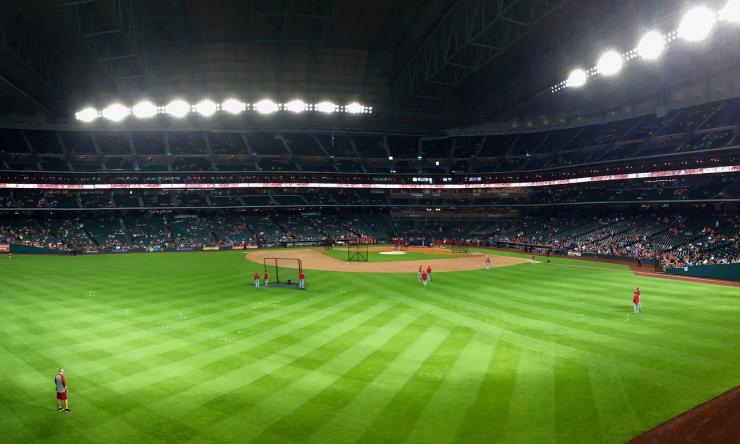How to stay safe when attending sports events
As sports stadiums reopen after closing last year due to COVID-19, it is no surprise that fans are eager to see their favorite teams play again. Experts at Baylor College of Medicine offer ways to remain safe if you decide to attend sports games in person.
Wear a mask and social distance
Dr. Jill Weatherhead, assistant professor of pediatrics - tropical medicine and infectious diseases at Baylor, said that it is essential to continue wearing a mask and practicing social distance, especially if the sports event is crowded, takes place indoors or involves yelling and singing.
“If you are in close contact with other people indoors or in a crowded location outside, it is important to continue these mitigation strategies until more people have been vaccinated and there is reduced viral transmission in the community,” she said.
Dr. Irvin Sulapas, a primary care sports medicine physician and assistant professor of family and community medicine at Baylor, advises sitting only with people that you know and are comfortable being around.
He adds that attending a game at a venue that has a lower capacity limit so fans have more room to spread out also will help prevent spread.
“When attending sporting events with a group, try to sit or stand next to family or friends in your own bubble,” Sulapas said. “We still have to be smart about attending sports events by social distancing and encouraging everyone to get vaccinated.”
While some sports venues have apps that allow you to order food without leaving your seat, Sulapas said to remember to adhere to social distancing guidelines when in line for food or drinks. Remember to wash and sanitize your hands before and after you eat.
Get vaccinated
The best way to protect yourself and others on game day is by getting the COVID-19 vaccine prior to attending the event.
“Vaccination is the most important thing you can do to keep yourself, family and friends as well as your community safe when going out to events,” Weatherhead said. “Make sure you have full immunity, which is two weeks after your last vaccine dose.”
Although COVID-19 vaccines are more accessible, there are still some who are not vaccinated yet. Weatherhead and Sulapas explain why it is still important to follow guidelines even if you already have the vaccine. One reason is that most children under 12 years old are still unable to receive the vaccine.
“Until a higher percentage of the community is vaccinated and viral transmission in the community decreases there remains opportunity to become infected even if vaccinated,” she said.
If someone is vaccinated against COVID-19, Sulapas explains it is possible to still be a carrier of the virus and spread it to someone who does not have the vaccine.
“Not everyone has the vaccine yet and there are a few cases of people with the vaccine still testing positive,” he said. “Their symptoms are little to none, but someone without the vaccine might not fare as well as someone who has been vaccinated. That is why we still need to wear masks and social distance, but as vaccination rates go up the cases will go down.”
Outdoor versus indoor events
Indoor events with poor ventilation that include a lot of yelling and singing are higher risk, while outdoor games with plenty of space to social distance are lower risk.
Although transmission is lower outdoors, it is recommended to still wear a mask if the event is crowded.
“Outdoor events with good ventilation and ability to keep distance from other fans have minimal risk particularly if you have received your vaccination,” Weatherhead said. “For example, golf has a lower risk due to the event occurring outdoors and the vast amount of space.”
If you are not feeling well or have been in contact with someone who has COVID-19, Weatherhead and Sulapas recommend not attending the event. If you attend a sports event, monitor for signs of COVID-19 for two weeks afterwards, and remember to get tested if you develop symptoms.










